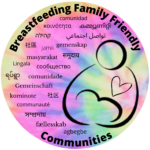The Centers for Disease Control and Prevention (CDC) has announced a major change: instead of publishing a Breastfeeding Report Card, they are now releasing the Early Childhood Nutrition Report Card.
This change reflects a growing recognition that infant and young child feeding is deeply connected to broader early childhood nutrition outcomes. By widening the lens, the CDC is inviting communities to see breastfeeding not as an isolated measure but as a critical foundation for lifelong health.
What This Means for Our Communities
At BFFC, we have been developing Breastfeeding Report Cards for each community to highlight local strengths, gaps, and progress in implementing the Ten Steps to a Breastfeeding Family Friendly Community.
This new CDC report offers us even richer context:
- It ties breastfeeding outcomes to nutrition security and child health.
- It provides state-level data that can strengthen our advocacy.
- It underscores the importance of equity, especially for communities that have been historically marginalized.
Going forward, BFFC will build on the CDC’s data in our local report cards. We recommend that each community coalition include the Early Childhood Nutrition Report Card in the appendix of their local Breastfeeding Report Card. This creates a clear bridge between national/state-level indicators and the lived realities of families in your community.
A North Carolina Lens
North Carolina continues to have both bright spots and challenges when it comes to child health and infant feeding.
- NC Child’s 2025 Child Health Report Card is another valuable resource: View the NC Child 2025 Report
- The U.S. Breastfeeding Committee (USBC) North Carolina profile provides additional context and comparisons to national benchmarks.
Together, these tools can help North Carolina communities—and our growing network of BFFC partners—paint a complete picture of what families need to thrive.
Next Steps
- Local BFFC coalitions should review the CDC’s new report alongside their community data.
- Report card writers should cite both national/state findings and local stories to illustrate impact.
- Appendices should include the CDC Early Childhood Nutrition Report Card, NC Child Report Card, and USBC NC profile to strengthen local advocacy.
This is a pivotal moment. By grounding our work in both data and community voices, we can continue building a movement that ensures every family has the support they need to breastfeed for as long as they choose.
